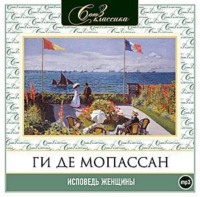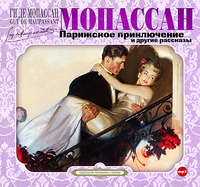 полная версия
полная версияComedy of Marriage and Other Tales
JACQUES DE RANDOL
And the Santelli is a seductress of this kind?
M. DE SALLUS
She is first among the first! Ah, the cunning little coquette! She knows how to make men run after her.
JACQUES DE RANDOL
Does she do only that?
M. DE SALLUS
A woman of that sort does not give herself the trouble of making men run after her unless she has some further object in view.
JACQUES DE RANDOL
The devil! You make me believe you attend two first nights in the same evening.
M. DE SALLUS
My dear boy, don’t imagine such a thing.
JACQUES DE RANDOL
Great heavens! you have such a satisfied and triumphant air – an air so desirous of calm at home. If I am deceived I am sorry – for your sake.
M. DE SALLUS
Well, we will assume that you are deceived and —
SCENE IV
(The same, and Mme. de Sallus.)
M. DE SALLUS [gaily]
Well, my dear, Jacques remains. He has consented for my sake.
MME. DE SALLUS
I congratulate you. And how did you achieve that miracle?
M. DE SALLUS
Oh, easily enough, in the course of conversation.
MME. DE SALLUS
And of what have you been talking?
JACQUES DE RANDOL
Of the happiness that comes to a man who remains quietly at home.
MME. DE SALLUS
That sort of happiness has but little attraction for me. I like the excitement of travel.
JACQUES DE RANDOL
There is a time for everything; and travel is very often inopportune and very inconvenient.
MME. DE SALLUS
But how about that important appointment of yours at nine o’clock? Have you given it up altogether, Monsieur de Randol?
JACQUES DE RANDOL
I have, Madame.
MME. DE SALLUS
You are very changeable.
JACQUES DE RANDOL
No, no, I am simply adapting myself to circumstances.
M. DE SALLUS
Will you pardon me if I write a note? [Sits at desk at the other end of the drawing-room.]
MME. DE SALLUS [to Jacques de Randol]
What has happened?
JACQUES DE RANDOL
Oh, nothing; everything is all right.
MME, DE SALLUS
When do we go?
JACQUES DE RANDOL
Not at all.
MME. DE SALLUS
Are you mad? Why?
JACQUES DE RANDOL
Please don’t ask me now about it.
MME. DE SALLUS
I am sure that he is laying a trap for us.
JACQUES DE RANDOL
Not at all. He is very quiet, very contented, and has absolutely no suspicion.
MME. DE SALLUS
Then what does it all mean?
JACQUES DE RANDOL
Now, be calm. He is happy, I tell you.
MME. DE SALLUS
That is not true.
JACQUES DE RANDOL
I tell you it is. He has made me the confidant of all his happiness.
MME. DE SALLUS
It is just a trick; he wishes to watch us.
JACQUES DE RANDOL
Oh, no; he is confiding and conciliatory. The only fear he has is of you.
MME. DE SALLUS
Of me?
JACQUES DE RANDOL
Yes; in the same way that you are, all the time, afraid of him.
MME. DE SALLUS
Great heavens! You have lost your head. You are talking at random.
JACQUES DE RANDOL
Listen – I am sure that he intends to go out this evening.
MME. DE SALLUS
Well, in that case, let us go out too.
JACQUES DE RANDOL
No, no, – I tell you there is nothing more for us to fear.
MME. DE SALLUS
What nonsense! You will end by maddening me with your blindness.
M. DE SALLUS [from the other end of the drawing-room]
My dear, I have some good news for you. I have been able to get another night at the Opera for you every week.
MME. DE SALLUS
Really, it is very good of you to afford me the opportunity of applauding Madame Santelli so often.
M. DE SALLUS [from the same place]
Well, she is very clever.
JACQUES DE RANDOL
And everybody says she is charming.
MME. DE SALLUS [irritably]
Yes; it is only such women who please men.
JACQUES DE RANDOL
You are unjust.
MME. DE SALLUS
Oh, my dear Randol; it is only for such women that men commit follies, and [sarcastically], understand me, the measure of a man’s folly is often the measure of his love.
M. DE SALLUS [from the same place]
Oh, no, my dear girl, – men do not marry them, and marriage is the only real folly that a man can commit with a woman.
MME. DE SALLUS
A beautiful idea, truly, when a woman has to endure all man’s caprices.
JACQUES DE RANDOL
Oh, no, not having anything to lose, they have nothing to risk.
MME. DE SALLUS
Ah, men are sad creatures! They marry a young girl because she is demure and self-contained, and they leave her on the morrow to dangle after a girl who is not young and who certainly is not demure, her chief attraction being that all the rich and well-known men about town have at one time been in her favor. The more danglers she has after her, the more she is esteemed, the more she is sought after, and the more she is respected; that is to say, with that kind of Parisian respect which accrues to a woman in the degree of her notoriety – a notoriety due either to the scandal she creates, or the scandal men create about her. Ah, yes, you men are so nice in these things!
M. DE SALLUS [laughs gently]
Take care! One would think you were jealous.
MME. DE SALLUS
I? Jealous? For whom do you take me? [The butler announces.] Madame is served. [Hands a letter to M. de Sallus.]
MME. DE SALLUS [to Jacques de Randol]
Your arm, M. Jacques de Randol.
JACQUES DE RANDOL [in a low tone]
How I love you!
MME. DE SALLUS [indifferently]
Just a little, I suppose.
JACQUES DE RANDOL
Ah, no; with all my soul!
M. DE SALLUS [after reading his letter]
Come along, then, let us go to dinner. I have to go out this evening.
CurtainMUSOTTE
JEAN MARTINEL
Nephew of M. Martinel, a painter; not yet thirty years of age, but already well known and the recipient of various honors.
LEON DE PETITPRÉ
Brother to Gilberts Martinel, a young lawyer about thirty years of age.
M. MARTINEL
An old gunmaker of Havre, aged fifty-five.
M. DE PETITPRÉ
An old magistrate, officer of the Legion of Honor. Aged sixty.
DR. PELLERIN
A fashionable physician of about thirty-five.
MME. DE RONCHARD
Sister to M. de Petitpré, about fifty-five years of age.
HENRIETTE LÉVÊQUE
Nicknamed Musotte; a little model, formerly Jean Martinel’s mistress. Twenty-two years of age.
MME. FLACHE
A midwife. Formerly a ballet-dancer at the Opera. About thirty-five years of age.
GILBERTE MARTINEL
Daughter of M. and Mme. de Petitpré, married in the morning to Jean Martinel. About twenty years old.
LISE BABIN
A nurse, about twenty-six.
SERVANTS
Time: Paris of to-day. The first and third acts take place in M. de Petitpré’s drawing-room.
The second act takes place in Musotte’s bedchamber.
ACT I
SCENE I
(A richly yet classically furnished drawing-room in M. de Petitpré’s house. A table, C.; sofas, R.; chairs and armchairs, L. Wide doors, C., opening upon a terrace or gallery. Doors R. and L. of C. Lighted lamps.)
Enter from R. M. de Petitpré, Monsieur Martinel, Madame de Ronchard, Léon de Petitpré, Jean and Gilberte. Gilberte is in her bridal attire, but without wreath and veil.
MME. DE RONCHARD [after bowing to M. Martinel, whose arm she relinquishes, seats herself R.]
Gilberte, Gilberte!
GILBERTE [leaves Jean’s arm]
What is it, Auntie?
MME. DE RONCHARD
The coffee, my dear child.
GILBERTE [goes to the table]
I will give you some, Auntie.
MME. DE RONCHARD
Don’t soil your gown.
LÉON [comes up]
No, no, not to-day shall my sister serve coffee. The day of her marriage! No, indeed, I will take care of that. [To Mme. de Ronchard.] You know that I am a lawyer, my dear Aunt, and therefore can do everything.
MME. DE RONCHARD
Oh, I know your abilities, Léon, and I appreciate them —
LÉON [smiles, and gives his Aunt a cup of coffee]
You are too good.
MME. DE RONCHARD [taking cup, dryly]
For what they are worth.
LÉON [aside, turns to the table]
There she goes again – another little slap at me! That is never wanting. [offers a cup to Martinel.] You will take a small cup, won’t you, M. Martinel, and a nip of old brandy with it? I know your tastes. We will take good care of you.
MARTINEL
Thank you, Léon.
LÉON [to Petitpré]
Will you have a cup, father?
PETITPRÉ
I will, my son.
LÉON [to the newly married couple, seated L. and talking aside]
And you, you bridal pair there? [The couple, absorbed in each other, do not answer.] Oh, I suppose we must not bother you. [He sets cup down on the table].
PETITPRÉ [to Martinel]
You don’t smoke, I believe?
MARTINEL
Never, thank you.
MME. DE RONCHARD
You astonish me! My brother and Léon would not miss smoking each day for anything in the world. But what an abomination a cigar is!
PETITPRÉ
A delicious abomination, Clarisse.
LÉON [turns to Mme. de Ronchard]
Almost all abominations are delicious, Auntie; in fact many of them, to my personal knowledge, are exquisite.
MME. DE RONCHARD
You naughty fellow!
PETITPRÉ [takes Léon’s arm]
Come and smoke in the billiard-room, since your aunt objects to it here.
LÉON [to Petitpré]
The day when she will love anything except her spaniels —
PETITPRÉ
Hold your tongue and come along. [Exit C.]
MARTINEL [to Mme. de Ronchard]
This is the sort of marriage that I like – a marriage that, in this Paris of yours, you don’t have very often. After the wedding breakfast, which takes place directly after you come from the church, all the guests go home, even the maids of honor and the ushers. The married couple remain at home and dine with their parents or relatives. In the evening they play billiards or cards, just as on an ordinary night; the newly married couple entertain each other. [Gilberte and Jean rise, and hand in hand slowly retire C.] Then, before midnight, good night!
MME. DE RONCHARD [aside]
Which is altogether very bourgeois!
MARTINEL [sits R. upon the sofa beside Mme. de Ronchard]
As to newly married couples – instead of going on that absurd and traditional thing you call a honeymoon, it is far better for them to go at once to the apartment or house prepared for them. I dare say you will think my plan lacking in fashion and display, but I cannot help that. For myself, I must say that I like absence of all ostentation.
MME. DE RONCHARD
Your plan is not according to the customs of polite society, Monsieur.
MARTINEL
Polite society, indeed! Why, there are thirty-six different kinds of polite society. For instance, take Havre.
MME. DE RONCHARD [interrupts]
I know only ours. [Corrects herself.] That is, I mean to say, mine, which is the correct one.
MARTINEL
Oh, naturally, naturally! Nevertheless, simple as it may be, this marriage is an acknowledged fact, and I hope that you have taken into your good books my dear nephew, who, until now —
MME. DE RONCHARD
I can hardly help doing so since he is my brother’s son-in-law, and my niece’s husband.
MARTINEL
Well, that is not the only thing, is it? I am very happy that the affair is over – although my life has been spent in the midst of difficulties.
MME. DE RONCHARD
What! Your life?
MARTINEL
I mean commercial difficulties, not matrimonial.
MME. DE RONCHARD
What commercial difficulties can you have – you, a Croesus who has just given five hundred thousand francs in dowry to his nephew. [With a sigh.] Five hundred thousand francs! Just what my late husband squandered.
MARTINEL
Oh! Yes, I know that, Madame de Ronchard.
MME. DE RONCHARD [sighs again]
I was ruined and deserted after just one year of married life, Monsieur – one year. I just had time to realize how happy I could be, for the scoundrel, the wretch, knew how to make me love him.
MARTINEL
Then he was a scoundrel?
MME. DE RONCHARD
Oh! Monsieur, he was a man of fashion.
MARTINEL
Well, that did not prevent him from —
MME. DE RONCHARD
Oh, don’t let us talk any more about my misfortunes. It would be too long and too sad, and everybody else is so happy here just now.
MARTINEL
And I am happier than anybody else, I assure you. My nephew is such a good fellow. I love him as I would a son. Now, as for myself, I made my fortune in trade —
MME. DE RONCHARD [aside]
That is very evident.
MARTINEL [resumes]
In the sea-going trade. But my nephew will gain fame for our name by his renown as an artist; the only difference between us is that he makes his fortune with his brushes, and I have made mine with ships. Art, to-day, Madame, may be as important as trade, but it is less profitable. Take my nephew. Although he has made a very early success, it is I who have enabled him to. When my poor brother died, his wife following him almost immediately, I found myself, while quite a young man, left alone with this baby. Well, I made him learn everything that I could. He studied chemistry, music, and literature, but he had a leaning toward art more than to the other things. I assure you that I encouraged him in it, and you see how he has succeeded. He is only just thirty, is well known, and has just been decorated.
MME. DE RONCHARD [dryly]
Thirty years old, and only just decorated; that is slow for an artist.
MARTINEL
Pshaw! He will make up for lost time. [Rises] But I am afraid I am getting boastful. You must pardon me, I am a plain man, and just now a little exhilarated by dining. It is all Petitpré’s fault. His Burgundy is excellent. It is a wine that you may say is a friend to wisdom. And we are accustomed to drink a good deal at Havre. [Takes up his glass of brandy and finishes it.]
MME. DE RONCHARD [aside]
Surely that is enough about Havre.
MARTINEL [turns to Mme. de Ronchard]
Well, there is a treaty between us – a treaty which will last – which no foolishness can break, such as that which has failed to break this marriage.
MME. DE RONCHARD [rises and crosses L.]
Foolishness! You speak very lightly about it. But now that the marriage is a thing accomplished, it is all right. I had destined my niece for another sphere than a painter’s world. However, when you can’t get a thrush, eat a blackbird, as the proverb says.
MARTINEL
But a white blackbird, Madame, for your niece is a pearl. Let me tell you, the happiness of these children will be the happiness of my declining years.
MME. DE RONCHARD
I wish that it may be, Monsieur, without daring to hope for it.
MARTINEL
Never mind. There are two things on which I am an expert – the merits of women and of wine.
MME. DE RONCHARD [aside]
Especially upon the latter.
MARTINEL
They are the only two things worth knowing in life.
SCENE II
(The same characters and Petitpré who enters C, with Léon.)
PETITPRÉ
Now that this red-letter day has gone by as any other day goes, will you play a game of billiards with me, Monsieur Martinel?
MARTINEL
Most certainly, I am very fond of billiards.
LÉON [comes down stage]
You are like my father. It seems to me that when anyone begins to like billiards at all, they become infatuated with the game; and you two people are two of a kind.
MARTINEL
My son, when a man grows old, and has no family, he has to take refuge in such pleasures as these. If you take bait-fishing as your diversion in the morning and billiards for the afternoon and evening, you have two kinds of amusement that are both worthy and attractive.
LÉON
Oh, ho! Bait-fishing, indeed! That means to say, getting up early and sitting with your feet in the water through wind and rain in the hope of catching, perhaps each quarter of an hour, a fish about the size of a match. And you call that an attractive pastime?
MARTINEL
I do, without a doubt. But do you believe that there is a single lover in the world capable of doing as much for his mistress throughout ten, twelve, or fifteen years of life? If you asked my opinion, I think he would give it up at the end of a fortnight.
MME. DE RONCHARD
Of a truth; he would.
LÉON [interrupts]
Pardon me, I should give it up at the end of a week.
MARTINEL
You speak sensibly.
PETITPRÉ
Come along, my dear fellow.
MARTINEL
Shall we play fifty up?
PETITPRÉ
Fifty up will do.
MARTINEL [turns to Mme. de Ronchard]
We shall see you again shortly, Madame.
MME. DE RONCHARD
Well, I have had enough of Havre for the present.
[Exit Martinel and Petitpré C.]
SCENE III
(Leon and Mme. de Ronchard.)
LÉON
Martinel is a good fellow. Not a man of culture, but bright as sunshine and straight as a rule.
MME. DE RONCHARD [seated L.]
He is lacking in distinction of manner.
LÉON [inadvertently]
How about yourself, Aunt?
MME. DE RONCHARD
What do you mean?
LÉON [corrects himself and approaches Mme. de Ronchard]
I said, how about yourself? You know what I mean – you have such an intimate knowledge of the world that you are a better judge of human nature than anyone I know.
MME. DE RONCHARD
Indeed, I am. You were too small a boy to recollect it, but nevertheless, I went a great deal into society before my husband spent all my money, and let me tell you that I was a great success. For instance, at a grand ball given by the Turkish ambassador, at which I was dressed as Salammbô —
LÉON [interrupts]
What, you, the Carthaginian princess?
MME. DE RONCHARD
Certainly. Why not? Let me tell you that I was greatly admired, for my appearance was exquisite. My dear, that was in eighteen hundred and sixty —
LÉON [sits near Mme. de Ronchard]
Oh, no dates! for goodness sake, no dates!
MME. DE RONCHARD
It is not necessary to be sarcastic.
LÉON
What! I, sarcastic? God forbid! It is simply this: in view of the fact that you did not wish this marriage to take place, and that I did, and that the marriage has taken place, I feel very happy. Do you understand me? It is a triumph for me, and I must confess that I feel very triumphant this evening. Tomorrow, however, vanish the triumpher, and there will remain only your affectionate little nephew. Come, smile, Auntie. At heart you are not as ill-natured as you pretend to be, and that is proved by the generosity of soul you have evinced in founding at Neuilly, despite your modest means, a hospital for – lost dogs!
MME. DE RONCHARD
What else could I do. When a woman is alone and has no children – and I was married such a short time – do you know what I am, after all? Simply an old maid, and like all old maids —
LÉON [finishes the sentence for her]
You love toy dogs.
MME. DE RONCHARD
As much as I hate men.
LÉON
You mean to say one man. Well, I could hardly blame you for hating him.
MME. DE RONCHARD
And you know for what kind of girl he abandoned and ruined me. You never saw her, did you?
LÉON
Pardon me, I did see her once in the Champs-Elysées. I was walking with you and my father. A gentleman and lady came toward us; you became excited, quickened your steps, and clutched nervously at my father’s arm, and I heard you say in a low voice, “Don’t look at them; it is she!”
MME. DE RONCHARD
And what were you doing?
LÉON
I? – I was looking at him.
MME. DE RONCHARD [rises]
And you thought her horrible, didn’t you?
LÉON
I really don’t know. You know I was only eleven years old.
MME. DE RONCHARD [crosses R.]
You are insufferable! Go away, or I shall strike you.
LÉON [soothingly, and rising]
There, there, Aunt, I won’t do it again. I will be good, I promise you, if you will forgive me.
MME. DE RONCHARD [rises, as if to go out C.]
I will not!
LÉON
Please do!
MME. DE RONCHARD [returns]
I will not! If it were simply a case of teasing me, I could let it pass, for I can take care of myself; but you have done your sister a wrong, and that is unforgivable.
LÉON
How?
MME. DE RONCHARD [stands R. of table and drums on it with her fingers]
Why, this marriage! You brought it about.
LÉON [imitates her action at L. of table]
That is true, and I did right. Moreover, I shall never be tired asserting that what I did was right.
MME. DE RONCHARD [still tapping on the table]
And for my part I shall never be tired of saying that Gilberte has not married the right man.
LÉON [still tapping]
Well, what kind of man do you think Gilberte ought to have married?
MME. DE RONCHARD
A man of position, a public official, or an eminent physician, or – an engineer.
LÉON
Do you mean a theatrical engineer?
MME. DE RONCHARD
There are other kinds of engineers. Then, above all, she should not have married a handsome man.
LÉON
Do you reproach Jean for his good looks? If you do, my dear Aunt, there are a good many men in the world who must plead guilty. Suppose, even, that a man has no need of good looks, it does not follow that he ought to be ugly.
MME. DE RONCHARD [sits on a little stool by the table, clasps her hands, and looks upward]
My husband was handsome, nay, superb, a veritable guardsman – and I know how much it cost me.
LÉON
It might have cost you a great deal more if he had been ugly! [Mme. de Ronchard rises to go away.] Besides Jean is not only good-looking but he is good. He is not vain, but modest; and he has genius, which is manifesting itself more and more every day. He will certainly attain membership in the Institute. That would please you, would it not? That would be worth more than a simple engineer; and, moreover, every woman finds him charming, except you.
MME. DE RONCHARD
That’s the very thing for which I blame him. He is too good and too honest. He has already painted the portraits of a crowd of women, and he will continue to do that. They will be alone with him in his studio for hours at a time, and everybody knows what goes on in those studios.
LÉON
You have been accustomed to go there, my dear Aunt?
MME. DE RONCHARD [dreamily]
Oh, yes. [Corrects herself.] I mean to say, once I went to Horace Vernet’s studio.
LÉON
The painter of battle scenes!
MME. DE RONCHARD
Well, what I say of Jean, I say of all artists – that they ought not to be allowed to marry into a family of lawyers and magistrates, such as ours. Such doings always bring trouble. I ask you as a man, is it possible to be a good husband under such conditions – among a crowd of women continually around you who do nothing but unrobe and re-dress themselves, whether they be clients or models (pointedly), especially models? [Mme. de Ronchard rises and Léon is silent.] I said models, Léon.
LÉON
I understand you, Aunt. You make a very pointed and delicate allusion to Jean’s past. Well, what of it? If he did have one of his models for a mistress, he loved her, and loved her sincerely for three years —








